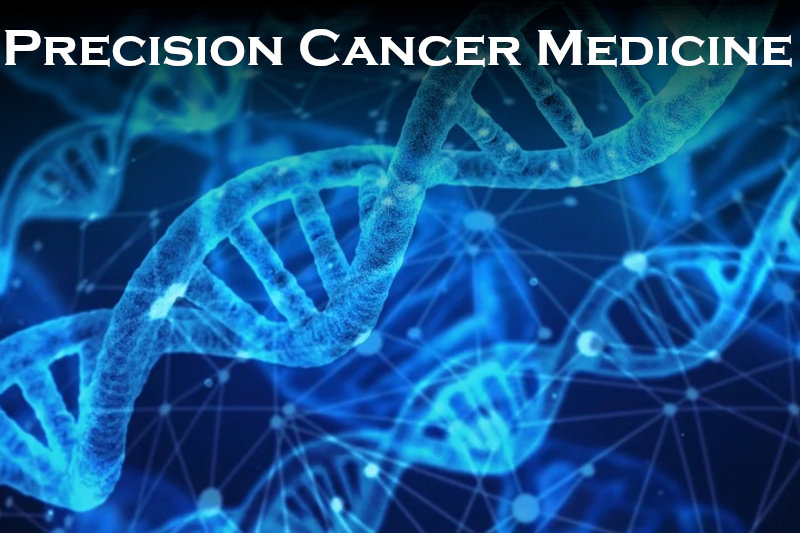Precision Medicine in Cancer Treatment

December 6th, 2023 | Cancer
Personalized Approaches and Breakthroughs
Imagine a day in the future when cancer treatment is a customized process, as distinct as the makeup of your DNA. In this area of science called precision cancer medicine, the complex relationships between genes, molecules, and individual attributes are being used to alter how cancer is treated drastically. It’s a world where the word “personalized” rules, giving those confronting this formidable foe new hope and better outcomes.
What is Precision Cancer Medicine?
Precision medicine in oncology, also known as personalized medicine (PM), is a novel approach to treating and preventing cancers. They take into account the lifestyle and comorbidities of each cancer patient, as well as inter- and intra-tumor genetic variability.
PM has the ability to modify the tumor’s immunological environment and target treatment at the tumor’s oncogenic drivers. Furthermore, PM aims to maximize the tumor response while taking each patient’s particular drug adverse effects into consideration.
Clinical trials have become so advanced and even more patient-centered! Many trials are constructed to recruit individuals with particular genetic mutations or biomarker profiles rather than relying only on general inclusion criteria. This increases the likelihood of discovering personalized medicine that is particularly effective for particular patient groups.
The development of targeted therapies has been increased by precision medicine by making it simpler to register suitable individuals in these trials.
In this approach, organ function and, consequently, quality of life are preserved while the tumor response is maximized. Additionally, this guarantees improved patient care in the end, which is obviously its goal.
Breakthroughs
- Groundbreaking breakthroughs have been made in the field of cancer therapy in the era of precision cancer medicine. A good example is liquid biopsies. These non-invasive diagnostic procedures look for signs like circulating tumor proteins, DNA, or biomarkers in physiological fluids like blood. By offering real-time data on the behavior of the illness and its response to treatment, it offers an advance in cancer management. The era of invasive tissue biopsies is over, and liquid biopsies advance with ease and accuracy!
- With the use of artificial intelligence, predictive modeling has become a potent tool. To predict how a patient will respond to various medications, these models take into account genetic information, prior medical history, and clinical characteristics. For oncologists, it’s comparable to a crystal ball that helps doctors make educated judgments rather than using the old trial-and-error method.
- Additionally, combination precision therapy for cancer has become more popular lately. Doctors may develop intricate treatment regimens employing precision medicine by utilizing targeted drugs, immunotherapies, and conventional therapies, among others. These combinations have broadened the range of cancer therapies that are now accessible, making tumors more attackable while bolstering their resistance to treatment resistance.
Conclusion
Precision cancer medicine serves as a tribute to human creativity and compassion. It is an adventure marked by curiosity, empathy, and a never-ending quest for better patient outcomes. The future gleams with the hope of new discoveries, precisely planned clinical trials, and monitoring resistance mechanisms to change tactics in real time.
As technology and research advance, personalized medicine will continue to be a guiding light. Hopefully, it will direct us toward a time when cancer therapies are as unique as the patients they treat. It will provide those fighting this unyielding opponent new hope and a better quality of life. If you’re looking for more inspirational content, don’t forget to read our other blogs.
Recent Posts
- Natural Ingredients for Pregnancy Nausea Relief: Safe Morning Sickness Tips for 2025
- Do Allergies Cause Nausea? How Allergy Symptoms Affect Your Stomach in 2025
- First Trimester Morning Sickness Relief: Expert Tips to Ease Nausea in 2025
- Safe Remedies for Road Trip Nausea: Natural Ways to Stop Motion Sickness in 2025
- Are Pregnancy Drops Safe for High-Risk Pregnancies? Ingredients, Tips & Expert Advice 2025
Categories
- All-Natural (4)
- Blog (47)
- Cancer (69)
- Diet (14)
- Holidays (20)
- Lifestyle (64)
- Motion Sickness (39)
- Nausea (72)
- New Mothers (33)
- Oncology Testimonials (3)
- Prebiotics (1)
- Preggie Products (6)
- Preggie Testimonial (23)
- Pregnancy (131)
- Queasy Products (8)
- Queasy Testimonial (16)
